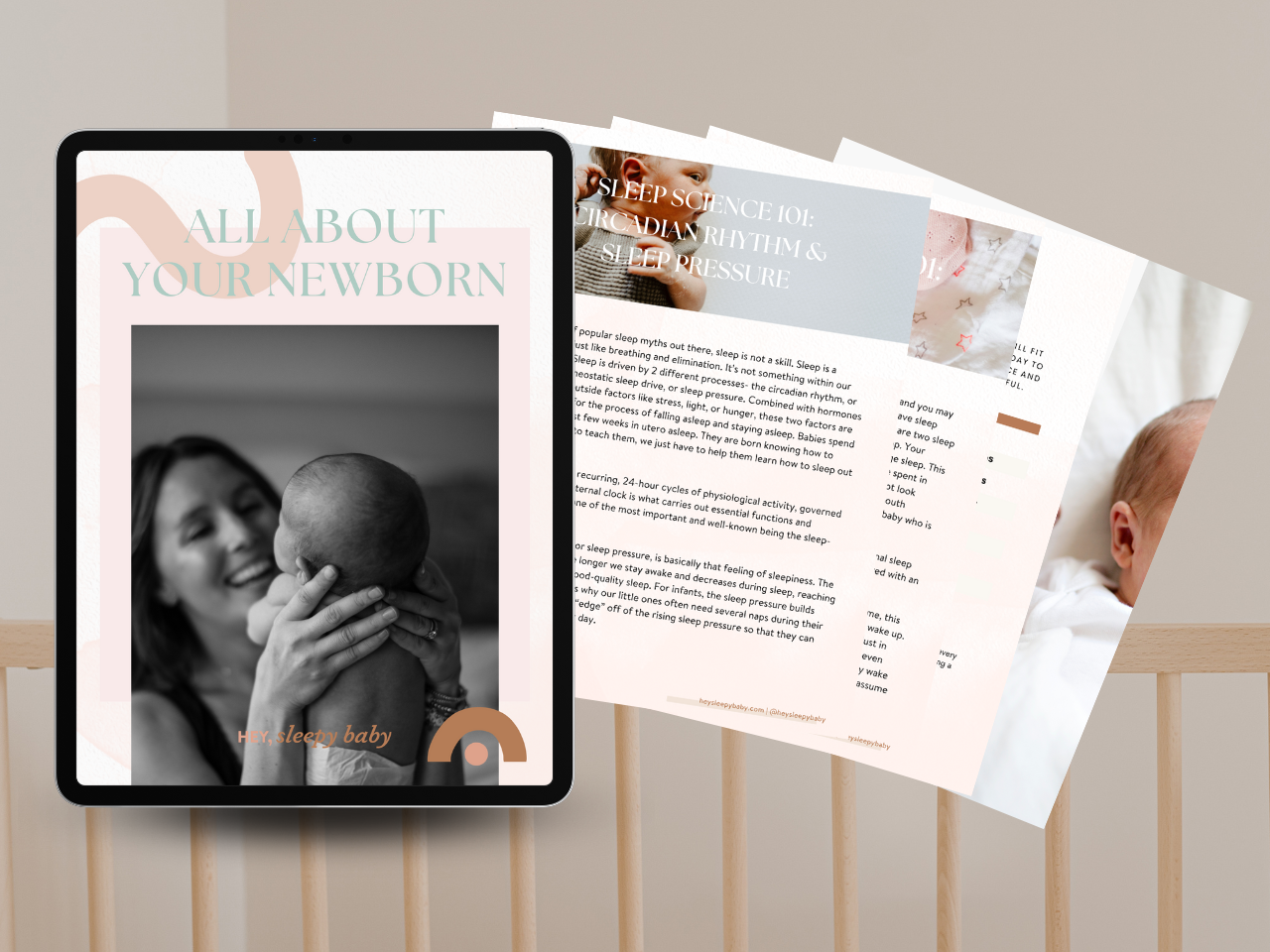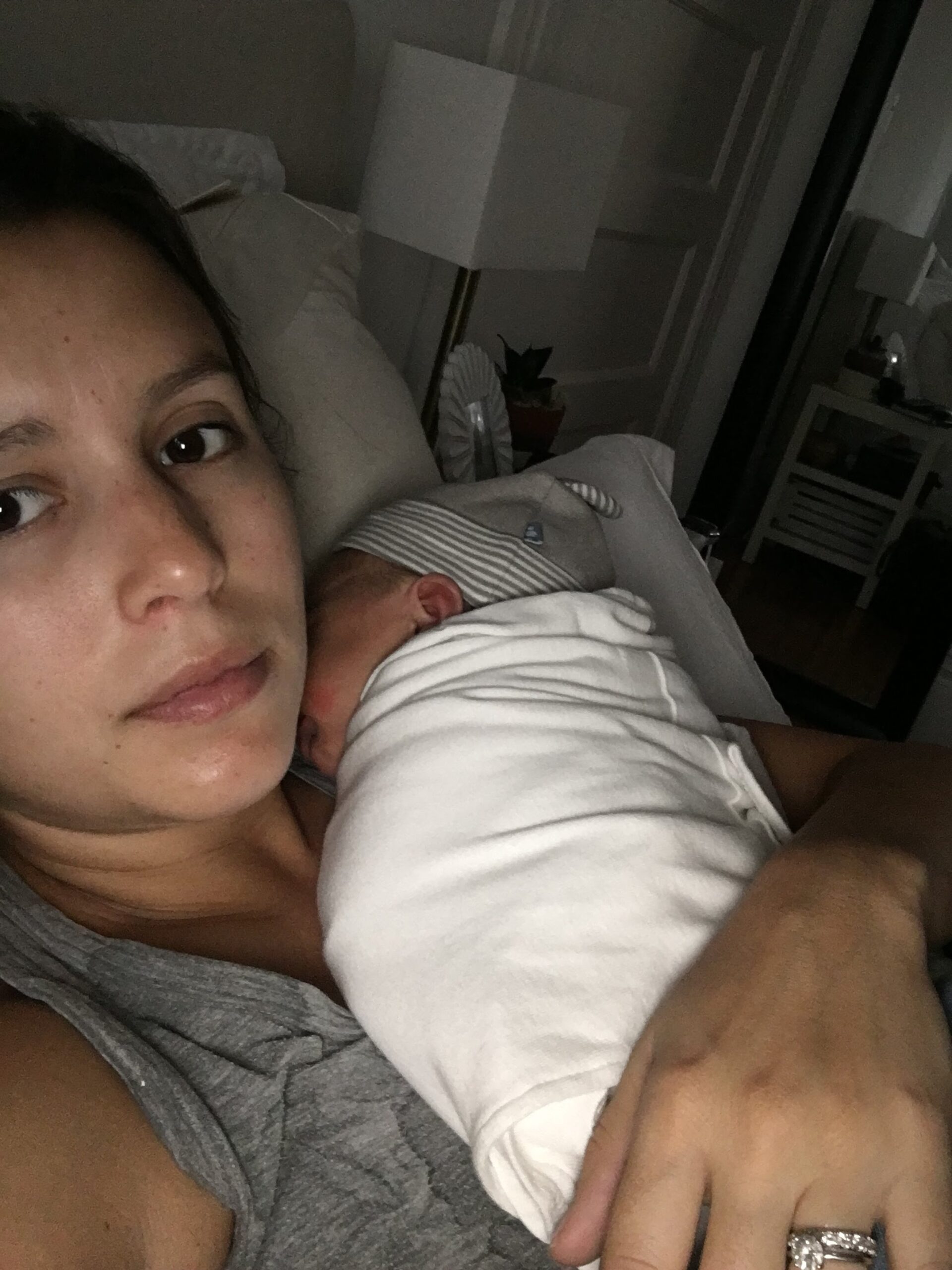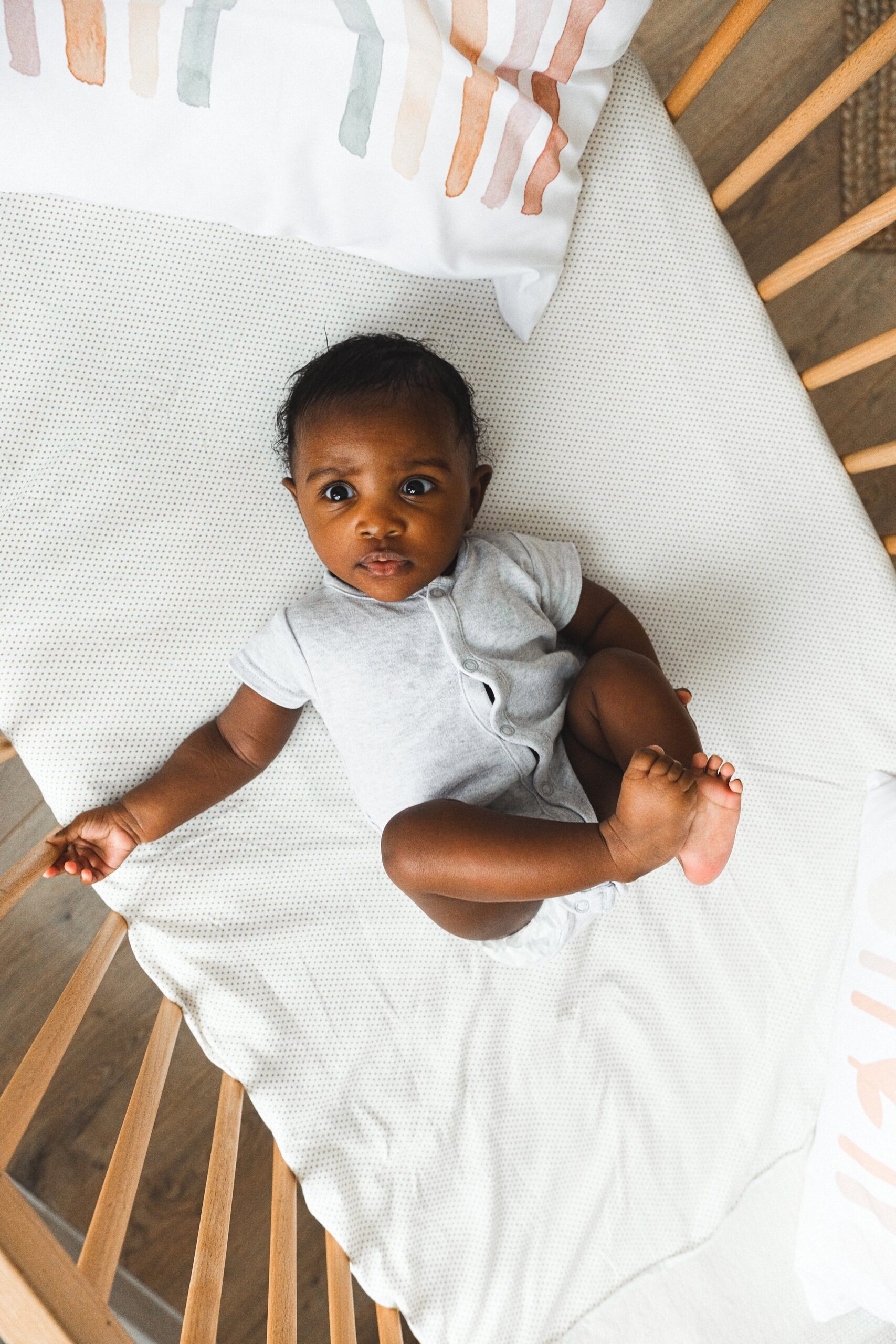I'm Rachael
Mom of 3 & Baby Sleep Expert with Big Sis Energy
& I’VE DONE ALL THE RESEARCH FOR YOU ALREADY.
Better sleep for the entire family
BROWSE COURSES
hey!
it’s ok if you don’t love the newborn stage
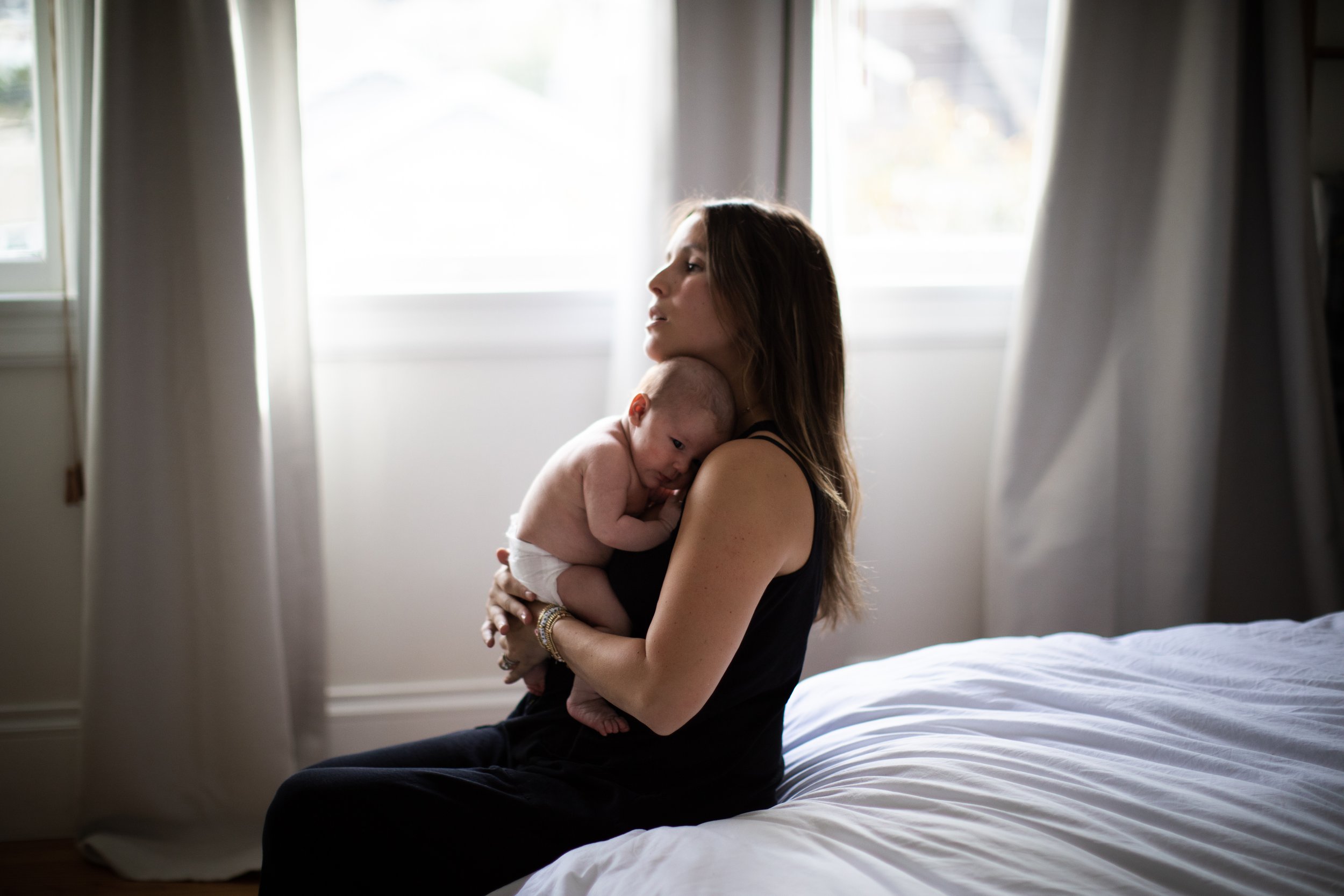
I can very clearly remember my first week as a mom, about 6 years ago. I was struggling so much with breastfeeding my tongue-tied baby. It was excruciating. I felt like I’d been hit by a bus after a brutal unmedicated labor with 2.5 hours of pushing. I was tearful and exhausted, and felt like my entire life had just been blown up. While I was “happy” to have my baby, it wasn’t the profound bliss I’d been expecting.
One night I was up breastfeeding, wincing in pain at every suckle. I was sobbing from the pain and the sleep deprivation, staring at my husband who was snoring away. Irritated with him and his useless nipples, I kicked him awake. If I was suffering I wanted him to suffer, too. I didn’t say anything and neither did he. He just sat up in bed and sat with me, rubbing my back as I fed our baby.
“Being a mom fucking SUCKS” I finally sobbed. I was not enjoying this- and the guilt about not enjoying it made me feel even worse. I was totally ashamed and completely overwhelmed with how I was feeling. I didn’t see the light at the end of the tunnel and thought this was my new life- forever. Once I was past the initial breastfeeding struggles (thanks to an amazing IBCLC and tongue tie release) and the Baby Blues lifted, I started to feel better. This was short-lived, unfortunately, because soon I started to spiral with anxiety about my baby’s sleep. I read everything I could get my hands on to try and make him sleep, and eventually succumbed to the pressure to sleep train. This didn’t go well and only made my anxiety worse. I really felt like I’d been robbed of the whole “new mom” thing.
The newborn period can be so intense- while so joyful in so many ways it can also be incredibly stressful. Your newborn’s sleep is one thing you might be worried about. In this post I’ll discuss some common questions that come up with newborn sleep and let you know what to expect in the first few weeks.
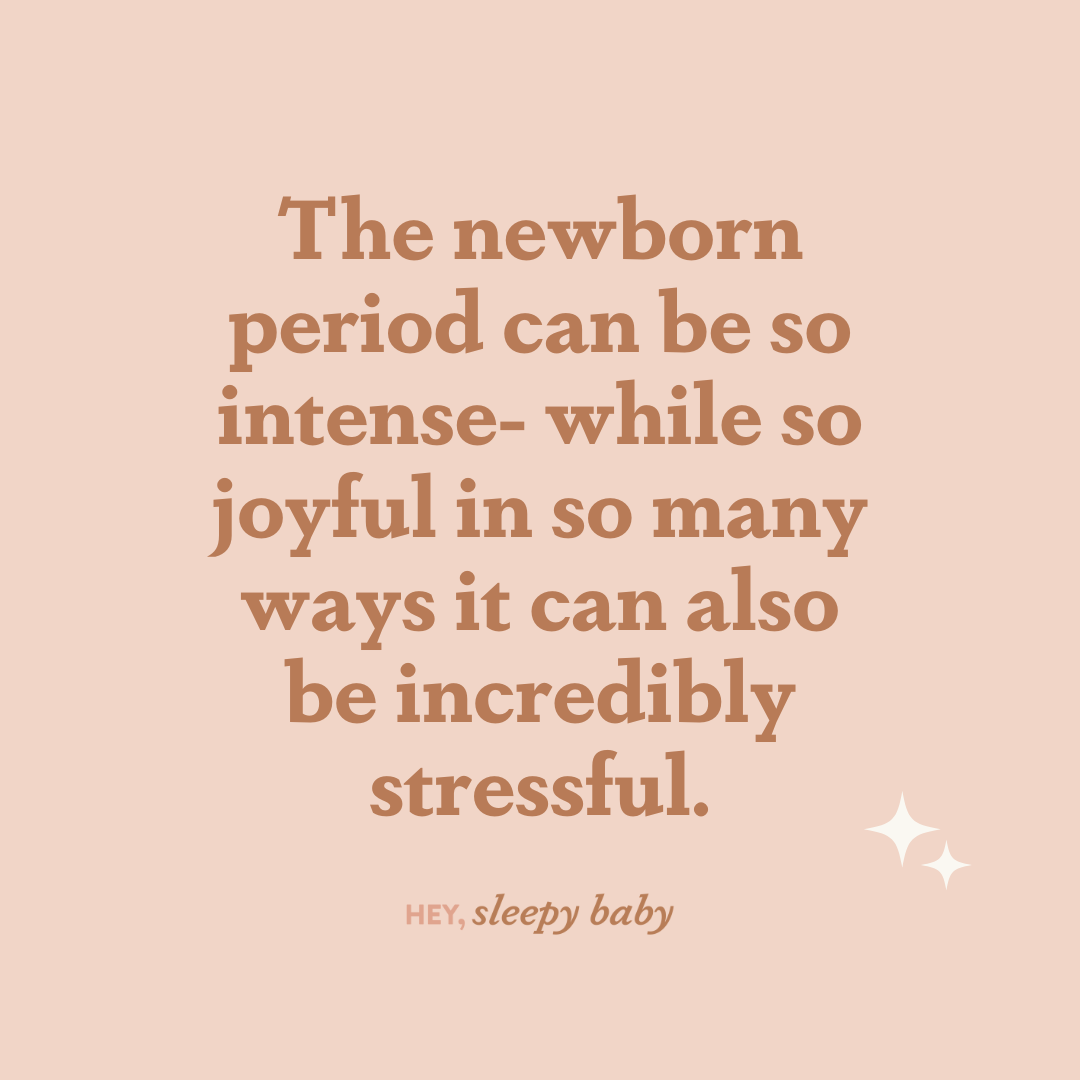
The first few weeks
In the first few weeks of life, babies spend most of their time sleeping, waking up only for feeds and diaper changes. You may find that your baby is incredibly sleepy and hard to wake. You may also find that your newborn stays awake and alert for long periods. There is such a range of “normal” for newborn sleep, but always contact your doctor and/or IBCLC if you are concerned with your baby being lethargic and not eating. You should also check in if your baby is staying awake for very long periods and are fussy, uncomfortable, or inconsolable. You can read more about infant colic in this blog post.
Newborns typically sleep for at least 14–17 hours hours a day (often more in the first couple of weeks) but their sleep is often fragmented, with periods of wakefulness lasting anywhere from 30 minutes to a couple of hours. This is because newborns have small stomachs and need to feed frequently, usually every 2-3 hours at least. Most breastfed newborns need at minimum 8-12 feeds per 24 hour cycle. It is also important to note that newborns do not have a well-established circadian rhythm, which means that they are not able to differentiate between day and night. This can lead to irregular sleep patterns, making it difficult for parents to establish a consistent sleep routine. This is normal, and it’s not expected for your newborn to be on a sleep or feeding schedule.
newborn feeding
Research has shown that if breastfeeding, feeding on demand vs. a clock schedule can be beneficial for both babies and mothers. A study published in the Journal of Human Lactation found that mothers who fed on demand had a higher milk production and were more likely to breastfeed for a longer duration than mothers who fed on a schedule. The study also found that babies who were fed on demand had a higher weight gain and were more likely to reach their birth weight by two weeks of age.
Another study published in the journal Pediatrics found that feeding on demand can help to regulate a baby’s sleep patterns. The study followed 124 mothers and their newborns for the first three months of life and found that infants who were fed on demand had more consolidated nighttime sleep by six weeks of age than infants who were fed on a schedule.
It is important to note that while feeding on demand can be beneficial, it may not be the right choice for every family. Some mothers may choose not to breastfeed or have difficulty producing enough milk to keep up with their baby’s demand (true under-supply is rare though, and should always be supported by a lactation professional), while others may find that feeding on a schedule works better for their family’s routine. It is important for mothers to discuss their feeding options with their healthcare provider and to choose the method that works best for them and their baby.
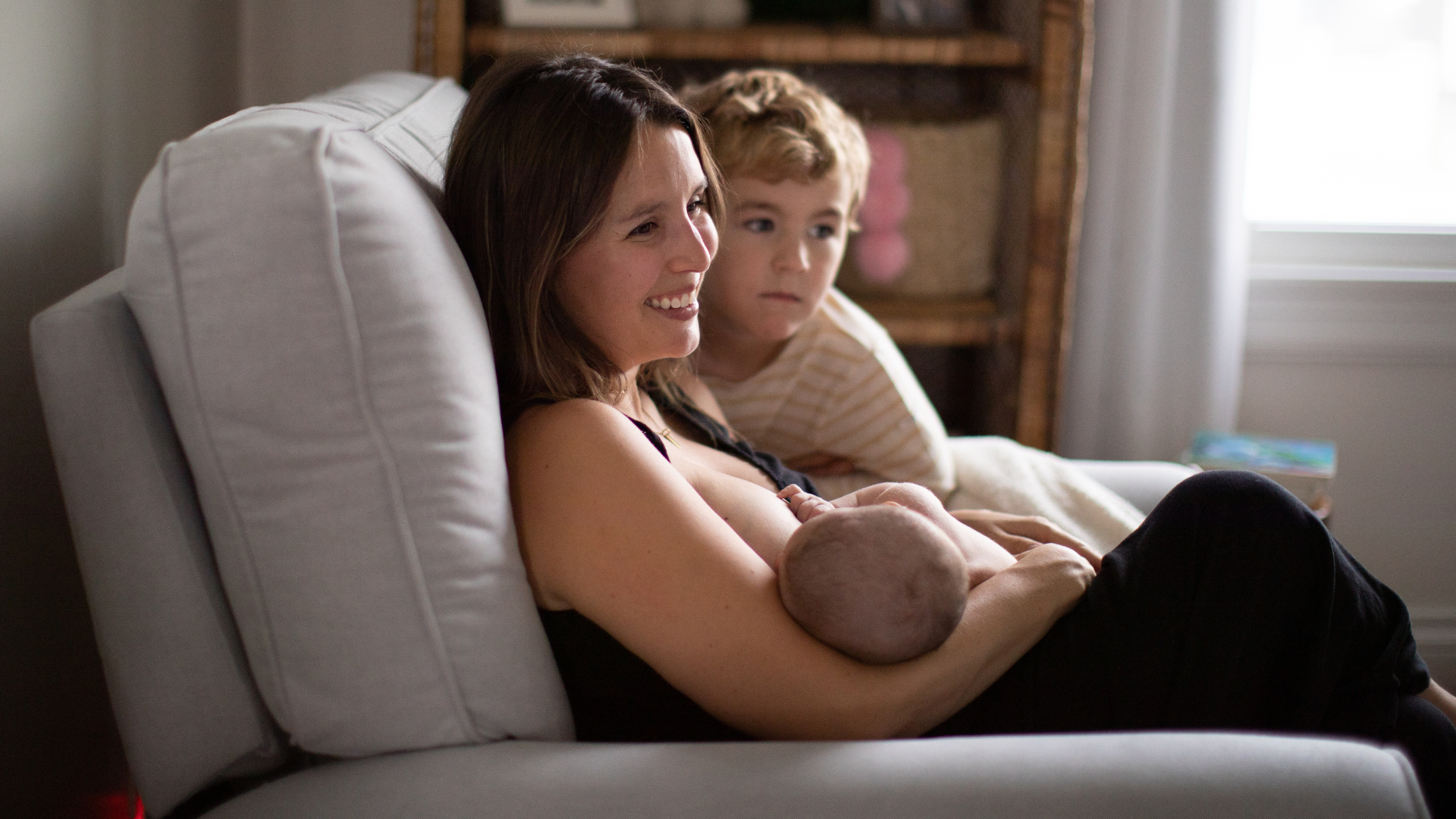
establishing healthy sleep
During the first month of life, many parents wonder what they can do to establish healthy sleep habits for their babies. This includes creating a safe sleep environment, placing the baby on their back to sleep, and keeping soft objects, loose bedding, and bumpers out of the crib. If you plan on cosleeping/ bed sharing, be sure that you can do so with the risks minimized by following the Safe Sleep Seven Guidelines.
In addition to creating a safe sleep environment and establishing a consistent bedtime routine, there are other things that parents can do to promote healthy sleep habits for their newborns. These include:
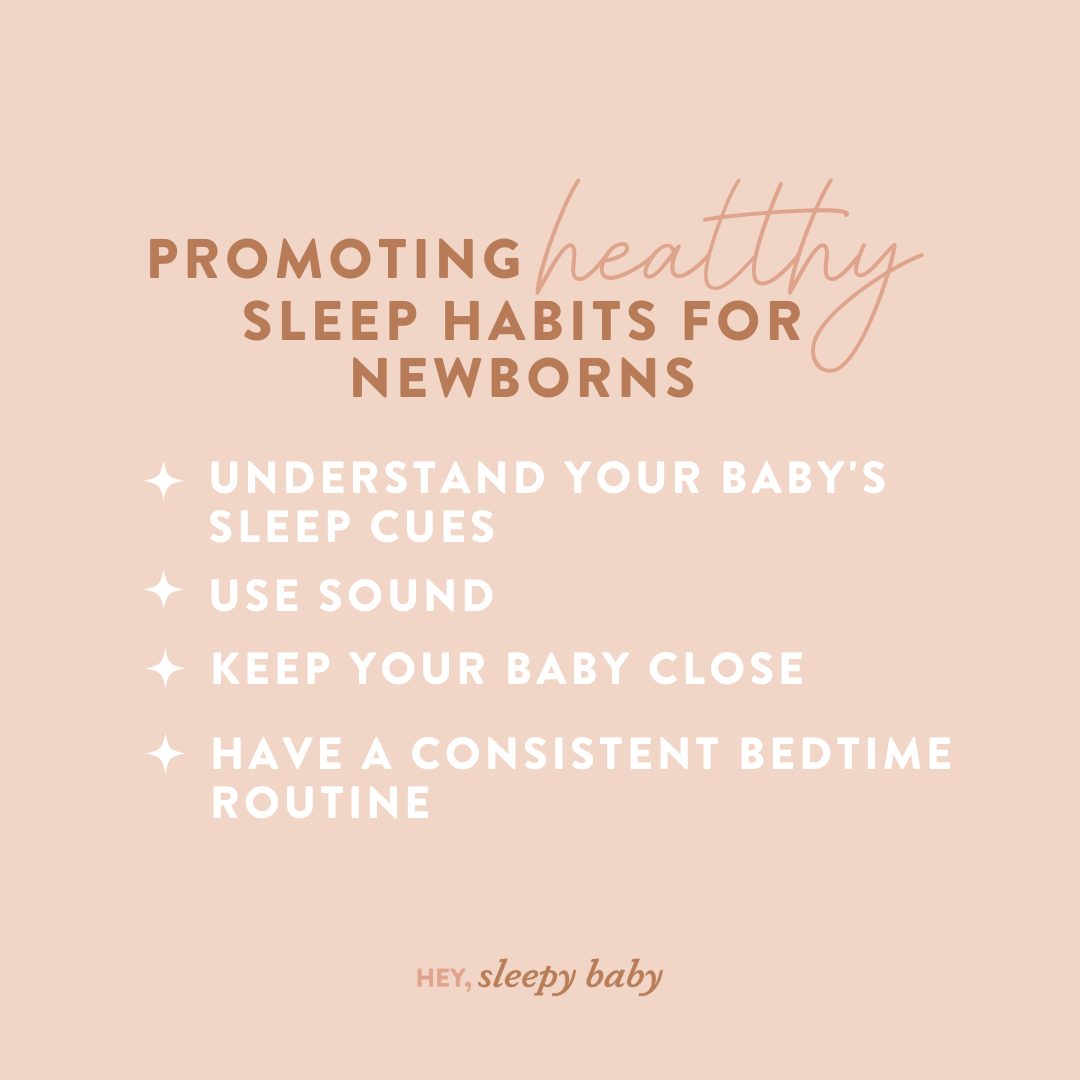
-
Understanding your baby’s sleep cues: Newborns often give signals when they are tired, such as rubbing their eyes, yawning, or becoming fussy. By learning to recognize these cues, parents can put their baby down for a nap before they become overtired, which can make it more difficult for them to fall asleep.
-
Using sound: Newborns are used to the constant noise of the womb, so using white, brown, or pink noise can help them to feel more secure and relaxed. Sound machines or apps can help to drown out other noises in the house and create a soothing environment for your baby to sleep in. You may find something else your little one enjoys, though- like the sound of the vacuum, shower, or hair dryer.
-
Keeping your baby close: For the first few weeks of life, many parents choose to keep their newborns close by sleeping in the same room. This can make it easier to respond quickly to their needs during the night and can also help to regulate their sleep patterns. The AAP recommends room sharing for sleep (day and night) for the first 6 months as a protective measure against SIDS.
-
A consistent bedtime routine can also help establish healthy sleep habits for the baby, such as giving the baby a warm bath, reading a story, or singing a lullaby before putting them down in their bassinet or crib. You can also do something more simple like a diaper change, massage, and feeding to sleep. Some babies are able to be put down awake, while others need to be transferred after they’ve fallen asleep. There’s no right or wrong way- just do what works for your baby! Keep in mind this is all likely to change as well. It’s common for newborns to sleep a lot and with little support in the early weeks and to need more help as they get older. Go with the flow and don’t get too attached to any one “right” way!
By following these tips, parents can help their newborns to establish healthy sleep habits without unnecessary stress. Remember, every baby is different, so it may take some trial and error to figure out what works best for your little one. This is one of the best parts of new parenthood- observing your baby and learning what makes them unique and special! Most of all, please know that just because things are hard right now doesn’t mean you’re doing it wrong. This parenting thing is hard, especially when we’re new at it! With my second two babies, I knew how fleeting the newborn stage was and I knew how to get support, and I enjoyed it so much more. The newborn stage is actually one of my favorite times now, because sleep isn’t something I stress over! I want that for you too.
If you’re struggling with your mental health during the newborn phase or beyond, check out Postpartum Support International for lots of free resources.
For more on newborn sleep, download this free guide from Hey Sleepy Baby.
If you’re looking for all the information you’ll need from the newborn stage through toddlerhood, check out the Newborn Masterclass which is the Essential Baby Sleep Course for New + Expecting Parents OR grab the Baby Bundle to set yourself up for the newborn phase. With this option you’ll get all the great stuff in the Newborn Masterclass PLUS The Ultimate Crib & Bed Guide.
Featured
I can very clearly remember my first week as a mom, about 6 years ago. I was struggling so much with breastfeeding my tongue-tied baby. It was excruciating. I felt like I’d been hit by a bus after a brutal unmedicated labor with 2.5 hours of pushing. I was tearful and exhausted, and felt like my entire life had just been blown up. While I was “happy” to have my baby, it wasn’t the profound bliss I’d been expecting.
With Valentine’s day fast approaching, the most important gift we can give to new mamas, is one which makes them feel seen, heard, and valued. So where do you even start?
Self care as a concept has always left me feeling slightly awful about myself. There were never enough hours in the day to do yoga, have a bath, go for a a run, journalling, bullet journalling, learning a new skill, making overnight oats and ensuring eight hours uninterrupted sleep. I am a terrible sleeper and would berate myself for not being able to complete the perfect self care task list and assign this as the reason I did not get the desired amount and type of slumber.
Was this helpful? Save it for later!

binge reads
We think you'll love these
You deserve to the
baby stage, not just "survive it."
And you DON'T have to sacrifice your values, ignore your instincts, or force yourself to follow a method you don't align with just to get your baby back to sleep.
I’m here to help you create a restful, sustainable sleep environment that honors both your baby’s needs AND your own (without the stress OR the guilt!) because, no, you don’t have to choose between the two.
enjoy!
BABY SLEEP COURSES →
BABY SLEEP CONSULTS →
Wish you could help your baby sleep better without resorting to sleep training? Download my FREE guide to a good night’s sleep and learn 8 simple, science-backed tips for supporting your child’s needs.
Traditional sleep training methods don’t have to be your solution to better sleep.
SLEEP TRAINING ISN’T THE ONLY WAY TO GET GOOD SLEEP
Hey, I'm Rachael and Hey, Sleepy Baby is for parents who want to get their nights back, without sleep training their babies.
NO ONE TOLD US POD
explorING the untold truths of parenting
